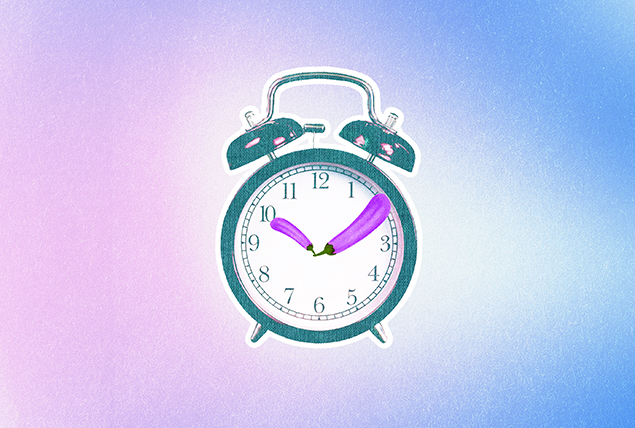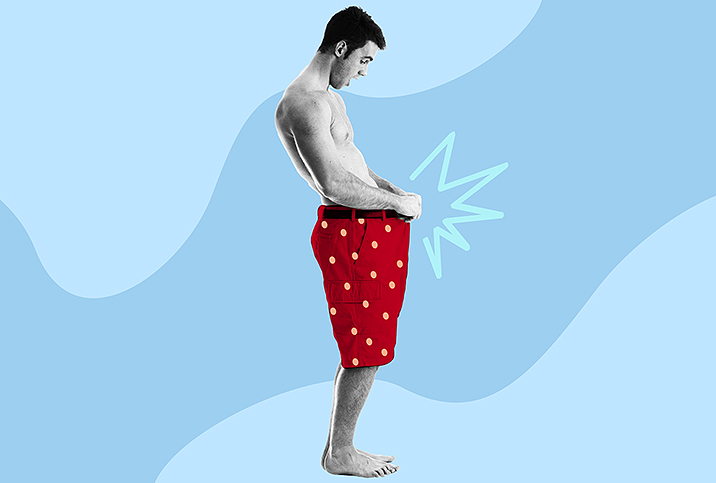How Long Can the Average Man Remain Erect?

An erection—its clinical name is penile tumescence, but it is more often referred to as a boner or wood or some other colloquialism—occurs when the penis becomes engorged with blood.
The surprisingly complex process typically kicks off with mental or physical stimulation, or a combination of both. When the process is initiated, the brain sends chemical signals to the erectile tissue in the penis, which causes the blood vessels to dilate, said Michael Werner, M.D., the medical director and founder of Maze Men's Sexual & Reproductive Health, based in New York City and Purchase, New York.
As blood rushes into the spongy tissue, the veins get compressed, effectively trapping the blood in the penis and making it hard.
But how long can the average man remain erect?
How long does the average erection last?
"In theory, the erection holds through intercourse and the erection is lost when a person ejaculates," Werner said. "So the real question would be, 'How long does intercourse last?'"
To answer that question, Werner cited a study from 2005 that involved 500 adult couples. For a month, they timed intercourse with a stopwatch, pressing "start" on penetration and "stop" at ejaculation.
"The reported durations of penetrative intercourse were from 33 seconds to 44 minutes, with the average being three to seven minutes—much less than people think," Werner said.
Factors influencing an erection
Where your erection duration falls on the 33-second-to-44-minute spectrum may depend on a number of factors, according to Justin Dubin, M.D., a urologist and men's health specialist with Memorial Healthcare System in South Florida and host of the podcast "Man Up: A Doctor's Guide to Men's Health."
"Everyone's different, everyone's medical problems, health and social situation is different," Dubin said. "To get to the heart of the question, you have to understand what can impact an erection."
The duration of erection is influenced by five factors, he said:
- Good blood flow
- Good nerves
- Normal testosterone levels
- Arousal
- Good state of mind
"The first one's good blood flow," Dubin said. "Things like heart disease and heart problems can compromise the blood flow to your penis and potentially impact your ability to maintain interaction during sexual stimulation."
Nerve health can be damaged by things such as surgery.
"But [nerves can also be compromised] by things people often don't think about, like diabetes," Dubin said. "Diabetic patients can get ED [erectile dysfunction], and if you're not taking good care of your diabetes, your erections may not last that long."
He added that people who have low testosterone levels might have issues getting or maintaining an erection for the desired length of time. Testosterone isn't the only factor in healthy erections, but it's enough of a factor to cause problems.
Finally, your state of mind needs to be positive.
"You need to be aroused," Dubin said. "That sounds obvious, but relationships can be complicated.
Anxiety or depression, and sometimes the medications used to treat these conditions, can also compromise your erections, he added.
How long is too long?
It is possible for the duration of an erection to last too long, Dubin said. It's a phenomenon known as priapism.
"Priapism is a persistent penile erection that really continues hours beyond or is really unrelated to sexual stimulation," he explained.
The most common type is ischemic priapism, according to Werner.
"During ischemic priapism, the erection is so rigid that the penis itself acts as a tourniquet and does not let new blood flow in, almost as if you tied a really tight string around your penis," he said.
If the condition lasts too long, it can cause serious, permanent damage to the penis.
"Prolonged erections can result in structural changes in the penis," Werner explained. "You get changes in the smooth muscle, which causes the dilation; you can get death of some of the muscle and cells. It can give you scar tissue and decreased inflow, making it difficult to get and maintain an erection."
Such erections—those that last longer than four hours—are a medical emergency.
"Time is really of the essence with priapism," Dubin said. "The longer the duration, the higher the risk of ED."
Priapism can happen spontaneously but is very rare, according to Werner.
"It's most commonly seen in men who get penile injections in order to get an erection," he said.
"Genetic disorders like sickle cell disease can put you at increased risk [for spontaneous priapism]," said Dubin, adding that cocaine and—in rare cases—certain antidepressants have been shown to cause priapism.
How to improve your erections
To maintain the Goldilocks standard of erection duration—that is, an erection neither too short in duration nor too long, but just right—Dubin advised to start by improving your heart health.
"What's good for your heart is good for your penis," he said. "You want to take care of yourself. Exercising, eating healthy, losing weight—these things can improve your erections because obesity is associated with heart disease, diabetes and low testosterone. And those three things can compromise your erections."
Erection problems are the most common health concern facing people with penises, Dubin emphasized.
"Erectile dysfunction is believed to impact as much as 50 percent of the male population," he said.
While erectile issues are closely correlated with increasing age, such concerns are increasing in men between the ages of 18 and 40.
"There's a huge stigma [around erection issues], and a lot of guys don't want to talk to a doctor," Dubin added. "I think that it's really important that we understand that these things are normal and there are ways to fix them."
If maintaining an erection is an issue you face, a wearable device might be a solution. Eddie® is an FDA-registered Class II medical device designed to treat erectile dysfunction and improve male sexual performance. Its shape is meant to optimize blood flow in and restrict blood flow out, and its fast-acting results allow you to treat ED with more control. With Eddie, you don't need to wait for a pill to kick in, use an awkward pump or subject yourself to painful injections.


















